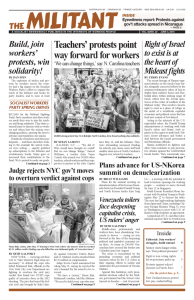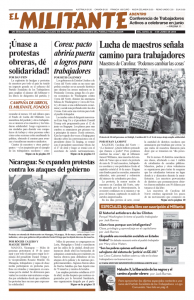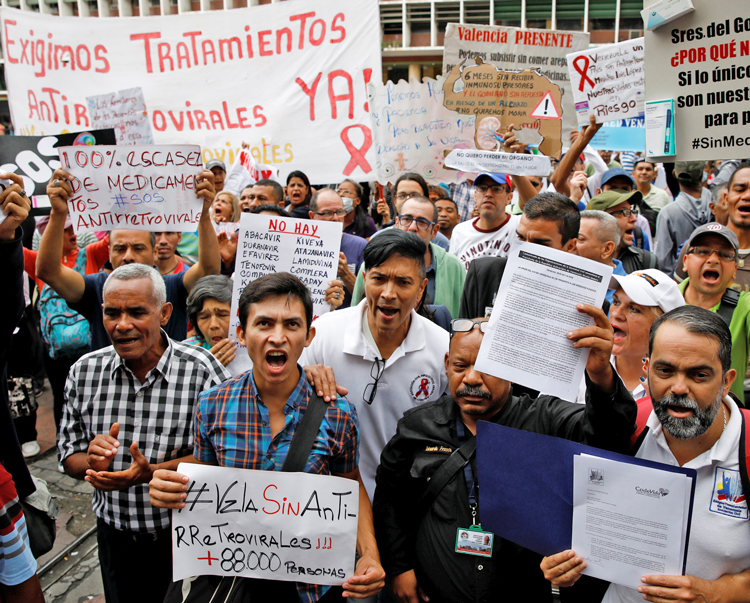Middle-class professionals and workers have been abandoning Venezuela in droves — seeing no way forward in the face of the deepening political and capitalist economic crisis there. As many as 250,000 Venezuelans have crossed the border into Colombia since last August.
The crisis is exacerbated by the punishing economic and political measures taken by the U.S. rulers in their ongoing efforts to isolate and undermine the government of Nicolás Maduro.
Against this backdrop, early presidential elections called by the Maduro government had the lowest voter turnout in decades — just 46 percent. Maduro was re-elected, getting 68 percent of the vote.
The U.S. rulers hope the economic hardships will open up rifts in Venezuela’s armed forces, leading to a coup and a government more to their liking. But they have no intention of invading, and are not likely to impose a ban on U.S. imports of Venezuelan oil. They fear these steps would throw the country into complete chaos. Instead, they have banned U.S. capitalists from buying new Venezuelan bonds and freezing the assets and bank accounts, if any, in the U.S. of members of the government.
Washington, which has never masked its hostility to Maduro or his predecessor Hugo Chávez and their relations with revolutionary Cuba, called the vote “sham elections.” Fourteen Latin American governments, including Brazil, Mexico and Colombia, announced they will not recognize the government and pledged to back Washington’s stepped-up pressure campaign.
Maduro, like Chávez before him, has attempted to “manage” capitalist social and political relations. They funded “welfare” programs that foster a corrupting dependence on government largesse. These steps were consciously counterposed to leading a working-class revolution, giving workers and farmers greater confidence in what they can accomplish in struggle, as was done by the July 26 Movement in Cuba.
After the collapse of oil prices and production, the government just printed money to make up for the drop in hard currency and inflation has soared.
But these policies only exacerbated the capitalist crisis and its impact on workers. Inflation is an estimated 50 percent per month. A quarter of working-class families eat two meals or less a day and shortages of basic medicines are widespread. Electricity and water outages are frequent.
Oil production in free fall
The Venezuelan government was hard hit by the steep drop in the price of oil — its main source of hard currency — to $50 a barrel last year. Even though oil is back up to $80, it has done little to refill the government’s coffers. Production has plummeted at the state-owned oil company, because of breakdowns in production facilities, corruption and bureaucratic mismanagement. Thousands of oil workers have quit and creditors have begun seizing company assets in other countries.
Many workers are taking action to try and combat the effect of the crisis. According to VPI-TV there were 927 protests against bosses or the government in April, 25 percent more than in the same period last year.
Thirty-five office workers at the Social Security Institute in Táchira, near the Colombian border, walked off the job May 2. “This is our first time ever on strike,” one worker told the press. “Our wages aren’t enough to take the bus to work.” Some 35 of the 70 workers have quit and left the country, she said. “If we can’t get a raise, I might leave too, even though I don’t want to.”
Workers at Masisa, a Chilean-based company in Anzoátegui that makes wood products for export, held a two-week strike in April to demand higher wages and investment to increase production. “What we earn is not even enough to feed our children,” union Secretary General Oniel Mendoza told VPI. Some 400 workers have quit.
Leading up to the election, Maduro appealed to the bosses to help him. “To the business class, who want to work together,” he said, “I am ready.”
Crumbling infrastructure
“We’re not protesting against that disgraceful Maduro,” a resident of a working-class area of east Caracas told the representative of the water company there during an April 27 demonstration. “We just want water.”
The official apologized, blaming the shut-off on a broken main and power outages. He said that they hoped to fix the problem soon and the water supply should go back to “normal” — three and a half days with water on, then three and a half without.
The May 20 elections did nothing to solve the crisis. The pro-imperialist opposition, discredited and with little support from working people, is divided and demoralized, with many of its leaders out of the country. The main group, the Democratic Unity Roundtable, urged a boycott. Its two most prominent figures, Leopoldo López and Henrique Capriles, were barred from the ballot. Months earlier they had organized a series of provocative and violent anti-Maduro actions, but virtually nothing leading up to the vote.
Two candidates did challenge Maduro, Henri Falcón and Javier Bertucci. Falcón, a former Maduro ally, launched his candidacy over the objections of the opposition. His program to solve the economic crisis centered on replacing the country’s currency with the U.S. dollar to try to stem runaway inflation, halting subsidized shipments of oil to Cuba and other Caribbean and Latin American nations to “save money,” and asking for international food aid.
Bertucci, a Pentecostal minister, said the answer was a return to Christian values. He attracted workers to his rallies by giving away free bowls of soup, but won few adherents or votes.
Maduro government officials set up what they called “red spots” right next to the polling places, where voters were told to bring the ID cards that entitle them to monthly government-subsidized food baskets — which most workers depend on to try and squeeze by each month — to prove they had voted. Many feared they would lose access to the cheaper food if they didn’t.


